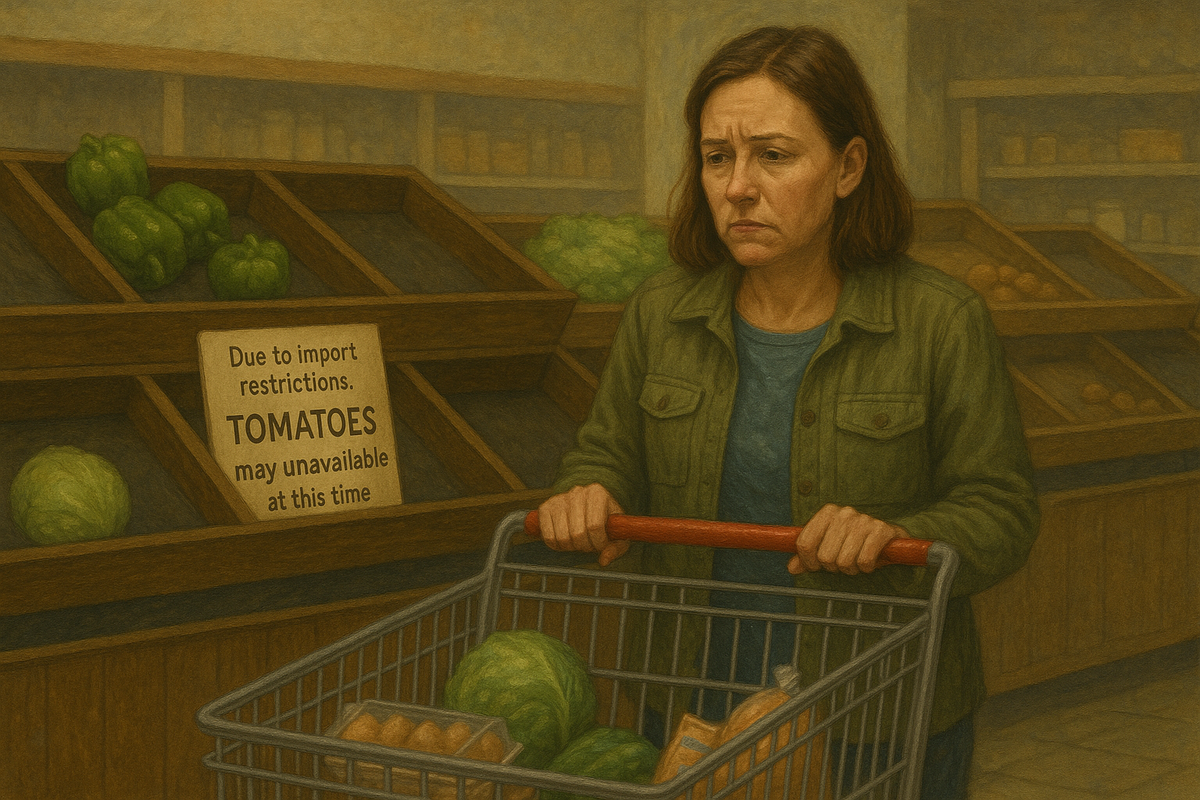Tomatoes in February

A short story set in 2026
The grocery store was quieter than usual. Not empty, not exactly—just subdued, like a library during finals week. Jenna pushed her cart through the automatic doors of Valley Market, already bracing for disappointment. Her daughter, Ava, had texted her earlier with a wish list: sushi rice, mango yogurt, cherry tomatoes for lunchboxes, Korean seaweed snacks, the chewy kind. Jenna had replied with a thumbs-up, though she already knew how this would go.
The produce section was her first stop, and it was a bleak sight. Bananas, apples, and oranges stood in tight little pyramids, bright and stiff, as if they were auditioning for a commercial. But the colorful chaos of global abundance she used to take for granted—the crates of dragon fruit, Chinese garlic, Thai basil, and impossibly cheap Persian cucumbers—was gone. What remained looked...local. And limited.
She rolled past the tomato bin, slowing. Empty. Again.
A hand-written sign hung limply from the shelf edge:
NOTICE TO CUSTOMERS: Due to import restrictions and current trade policy, certain produce items may be unavailable or priced higher than usual. We appreciate your understanding.
“Understanding,” Jenna muttered under her breath. “Sure. Always understanding.”
Last year, she'd read about the tariffs—how they were going to "protect American industry" and "level the playing field." But what that meant for her, in practice, was that the $1.79 can of Chinese lychees was now $6.29. That her kids’ favorite ramen cups were nowhere to be found, and the soy sauce choices had dwindled from fifteen brands to three—none of them quite right. The big 145% tariff on Chinese imports had hit hard. And it wasn’t just China. Mexico was now facing tariffs too—tomatoes, peppers, avocados. Produce she relied on to break the monotony of winter.
The store had started to reflect it: fewer choices, smaller shipments, higher prices.
She walked through the aisles slowly, scanning the shelves with the trained eye of a mother who’d made a thousand mental substitutions. Sushi rice? Gone. A dusty shelf label marked the spot, but it hadn’t been restocked in weeks. In its place were bags of arborio and short-grain California rice—fine, but not the same. No sesame oil, no pickled daikon, no miso paste.
At the dairy section, she stood in front of a mostly full fridge, but half the labels were new. Store-brand yogurts, American-style with sugar-laden fruit on the bottom. Gone were the little Japanese yogurt drinks Ava loved, the ones that made her giggle and shout, “These are so cute!” Jenna picked up a large tub of Greek yogurt and made a mental note to slice some mango into it. If she could find mango.
There was something surreal about how quickly the world had changed. Three years ago, her pantry was a shrine to internationalism. She had Thai curry pastes in four colors. Two brands of gochujang. A whole shelf of vinegars: black, rice, mirin, apple, malt, balsamic. She used to joke that if you spun her spice rack, it could land in a different country.
Now, the spice rack was dusty. The jars were half-full. She rationed the last of her fish sauce the way her grandmother used to ration coffee during the postal strikes in the 1970s.
She turned the cart into the freezer aisle and saw an elderly man holding up a bag of frozen edamame, squinting at the price. "$9.89," he said aloud, shaking his head and placing it back in the freezer like it might bite him.
She continued on, grabbing a bag of frozen peas and corn. The peas would have to stand in for green beans. The corn might become a stir-fry, if she still had hoisin.
At the checkout line, the clerk—Julia, a girl no older than nineteen—gave her a wan smile. “Find everything okay?” she asked automatically.
Jenna gave a half-laugh. “Define ‘okay.’”
Julia shrugged. “We just got an update from corporate. They’re pulling out of some international vendors entirely. Too expensive to ship now.”
Jenna nodded. “I figured.”
She paid, feeling the sting as the total passed $130 for a cart barely two-thirds full. No tomatoes. No seaweed snacks. No joy.
As she wheeled the cart into the parking lot, she paused for a moment under the overhang. The Florida sun was warm on her back. It was February. She remembered being a child and seeing tomatoes in winter as a kind of miracle. In the '80s, her mom used to pick through the sad, flavorless ones flown in from God-knows-where. But by the time Jenna was a young mom herself, tomatoes in February were normal. They came from Mexico, Guatemala, China. She’d forgotten they were ever seasonal.
Now, they were seasonal again.
She loaded the groceries into the back of her hybrid and sat in the driver's seat a moment longer than necessary. The car was quiet. She checked her phone. Ava had texted again:
Got the seaweed?
Can we make poke bowls tomorrow?
Jenna stared at the screen.
No seaweed. No sushi rice. But I’ll figure something out.
We’ll make do.
She started the car. Maybe the little Korean market in the plaza with the Urgent Care still had some seaweed snacks. Or maybe it didn’t. But she’d go check anyway.
Because that’s what mothers do. They improvise. Even when the shelves look like it’s 1957 again. Even when the world shrinks around them.
She adjusted the rearview mirror and pulled out of the parking lot, thinking about dinner. Maybe a roast chicken. Maybe rice and peas. Or maybe something new.
Something American.



